|
|
|
Sort Order |
|
|
|
Items / Page
|
|
|
|
|
|
|
| Srl | Item |
| 1 |
ID:
164582


|
|
|
|
|
| Publication |
Studies in Conflict and Terrorism Vol: 41 No 10-12.
|
| Summary/Abstract |
This article argues that prospects for negotiations with Al Qaeda and the Islamic State have been undertheorized. Drawing on nearly two thousand pages of primary source material— all issues of Inspire and Dabiq magazines published at the time of writing—it examines these groups' statements about their motivations for violence, their objectives, and their views about the possibility of dialogue with the West. It finds stark differences in all three areas and suggests that assumptions that have prevented theorizing about negotiations with these groups should be revisited.
|
|
|
|
|
|
|
|
|
|
|
|
|
|
|
|
| 2 |
ID:
160126
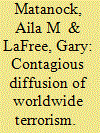

|
|
|
|
|
| Summary/Abstract |
Studies of the contagious spread of insurgency and conflict across national boundaries has generated a good deal of empirical research over time. While the contagious spread of terrorism has also been a policy concern, few empirical studies exist on the extent to which terrorism spreads contagiously. This article uses methods developed by criminologists to study the spread of crime to examine the worldwide diffusion of terrorism from 1970 to 2013. We distinguish between contagious increases (based on shared borders) and non-contagious increases (where no borders are shared). We define the “domino effect” as a particular type of contagious diffusion where high levels of terrorism spread to an adjoining country but also remain high in the host country. Our analysis shows that both contagious and non-contagious diffusion has been rare over the past 43 years, non-contagious diffusion is more common than contagious, and when contagious diffusion occurs, it is very likely to occur according to the domino effect.
|
|
|
|
|
|
|
|
|
|
|
|
|
|
|
|
| 3 |
ID:
160127
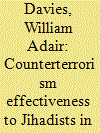

|
|
|
|
|
| Summary/Abstract |
A comparative analysis of Islamic extremism post-9/11 to 2015 and the effectiveness of the counterterrorism (CT) authorities to counter it in both Western Europe and the United States was conducted. Four measures of effectiveness revealed that 2010–2015 saw a gradual increase in jihadi attacks and in casualties emanating from these attacks, and more jihadists, foreign fighters, and material supporters. Additionally, 2013–2015 saw a 22 percent reduction both in Western Europe and the U.S. CT agencies' ability to counter Islamic extremism. We are losing the War on Terror and our citizens are less safe than they were six years ago. Further analysis revealed that singleton jihadists: (1) were much harder than group-based jihadists to uncover, (2) have been increasing since 2009, and (3) have generated over 70 percent of all jihadi violence. Finally, numerous similarities exist between Western Europe and the United States with respect to jihadism in their homelands and their respective CT effectiveness, indicating close cross-Atlantic CT collaboration since 9/11. This in-depth analysis provides essential threat/hazard information to security, law enforcement, intelligence, and policymaking personnel and the greater homeland security communities.
|
|
|
|
|
|
|
|
|
|
|
|
|
|
|
|
| 4 |
ID:
160130
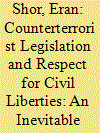

|
|
|
|
|
| Summary/Abstract |
The literature on counterterrorist measures often emphasizes the potential harmful effects of such measures on human rights and civil liberties. While recent research has examined the effects of counterterrorist legislation on the violation of physical integrity rights (e.g., torture and extrajudicial killings), no quantitative cross-national study has looked at the consequences for civil liberties. Still, case studies in a variety of countries suggest that counterterrorist legislation indeed leads to various infringements of liberties such as the freedoms of expression, religion, assembly, and movement. We conduct a cross-national time series analysis of counterterrorist legislation and consequent repression of civil liberties for the years 1976–2009. We find that the effects of legislation vary by levels of initial repression. Legislation has a negative effect on respect for civil liberties in countries with moderate levels of repression. However, this effect diminishes in non-repressive countries and reverses in countries with high levels of repression.
|
|
|
|
|
|
|
|
|
|
|
|
|
|
|
|
| 5 |
ID:
160128


|
|
|
|
|
| Summary/Abstract |
As part of their common efforts to undermine public support for their militarily-stronger adversaries' war efforts, insurgents and other militarily weak actors often accuse governments of fighting in a brutal manner and of committing brutal acts such as deliberately targeting innocent civilians. While sometimes there is sufficient evidence to support this claim of the government's deliberate brutality, other times militarily-weak actors will lack sufficient evidence to support this allegation. In such situation of lack of evidence, instead of making only those minimal allegations which can still be support by existing available facts, some weak actors decide nevertheless to make unsubstantiated claims and resort to fabricating the necessary evidence. This behavior presents a challenge not only for many counterinsurgent governments but also for the larger international community (most notably by diverting attention away from real atrocities). We identify some of the most common evidence-forging techniques recently employed by weak actors designed to create the factual basis to support of their chosen (often false) narratives of government brutality. The study also discusses some implications for international actors to prevent rewarding faking of atrocities.
|
|
|
|
|
|
|
|
|
|
|
|
|
|
|
|
| 6 |
ID:
160132
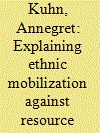

|
|
|
|
|
| Summary/Abstract |
The causal mechanisms linking natural resources and ethnic mobilization remain highly contested in the literature. Using novel data generated from interviews with ethnic representatives in Bolivia, the article addresses this research gap by combining a most similar systems design comparison of two local cases with a deviant case analysis. Results indicate that while resource-related grievances are a necessary motive for contention in terms of resource extraction, they have to concur with opportunity factors in the sense of strong local organizational capacities. Both explanatory conditions are, moreover, necessarily embedded in contentious collective action frames of a noncompliant and discriminatory state.
|
|
|
|
|
|
|
|
|
|
|
|
|
|
|
|
| 7 |
ID:
160133
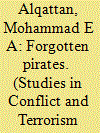

|
|
|
|
|
| Summary/Abstract |
If piracy attacks are unreported, a misleading impression is given of piracy situations in regions where there could be serious consequences for ships traveling in waterways on the assumption that they are piracy-free waters. However, sometimes not reporting piracy attacks could help to contain piracy before it expands, because reporting can lead to the media over-focusing on piratical incidents, and armed guards being deployed on ships, which causes pirates to use heavier arms and escalates the level of conflict. Piracy that took place during 2003–2012 in the north and the center of the Arabian Gulf has never been reported to the International Maritime Bureau. The present article examines this case of unreporting, and discusses its causes and consequences.
|
|
|
|
|
|
|
|
|
|
|
|
|
|
|
|
| 8 |
ID:
160137
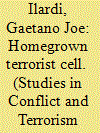

|
|
|
|
|
| Summary/Abstract |
On 10 October 2004, an improvised explosive device was detonated in bush land in the vicinity of Mount Disappointment on the outskirts of Melbourne, Australia. A relatively small device, it was assembled and detonated by one of the two men present, a Victoria Police officer and undercover operative known as Security Intelligence Officer 39, or SIO39. The other person was the leader of a homegrown terrorist cell, who in the months preceding had assembled a group of a dozen individuals who became the subject of Australia's largest counterterrorism investigation known as Operation Pendennis. This article, which is based on in-depth interviews with SIO39, provides unique insights into a range of activities and behaviors peculiar to this cohort. Commencing his association with the group early in its development, SIO39 was privy to some of its key evolutionary stages, from a collection of individuals meeting more or less in the open, to a clandestine body that clearly harbored terrorist intent and undertook a number of overt acts to advance its violent objectives.
|
|
|
|
|
|
|
|
|
|
|
|
|
|
|
|
| 9 |
ID:
160134


|
|
|
|
|
| Summary/Abstract |
The field of terrorism research has arguably long been characterized by a separation of the scholars from their subject of inquiry. Interviews can be used to bridge this chasm, but making contact with potential interviewees, conducting interviews, and analyzing the data pose unique challenges when conducting research into jihadists, especially active ones. This article focuses on the author's experience of interviewing both former and active jihadi foreign fighters. It is specifically intended to contribute to a better methodological understanding of conducting first-hand empirical research into jihadi foreign fighters and builds on fieldwork conducted in Sweden, Iraq, and Lebanon.
|
|
|
|
|
|
|
|
|
|
|
|
|
|
|
|
| 10 |
ID:
160131


|
|
|
|
|
| Summary/Abstract |
Recent research has begun to explore the causes of organizational death for domestic far-right extremist groups. An important aspect that has not been examined is whether or not a group's participation in violence influences its longevity. This study addresses this gap in the literature by examining over 400 domestic far-right extremist groups that persisted for varying lengths of time to determine whether or not group participation in violence influences their longevity. Additionally, this study also examines whether a variety of external (environmental) and internal correlates influence the longevity of violent and nonviolent groups differently.
|
|
|
|
|
|
|
|
|
|
|
|
|
|
|
|
| 11 |
ID:
160135


|
|
|
|
|
| Summary/Abstract |
Participation in political violence draws on identities and world views that have been shaped and influenced by emotion. This article uses data drawn from interviews conducted with 15 former members of the Provisional Irish Republican Army to highlight some of the ways that emotion is intertwined with decisions to use violence in pursuit of a substate political goal. Six themes emerge that help to demonstrate how participant's emotional lives have helped to build the identities, beliefs, and motivations that have led to violent acts. The study illuminates how the experience, elicitation, and management of emotions played an integral role in the participant's trajectory towards violence.
|
|
|
|
|
|
|
|
|
|
|
|
|
|
|
|
| 12 |
ID:
160129
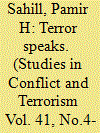

|
|
|
|
|
| Summary/Abstract |
This article, employing a poststructuralist Critical Discourse Analysis, reveals cracks, discrepancies, and inconsistencies in Pakistan's discourse on terrorism and practice. I argue that Pakistan continuously constructs a “monstrous enemy” and magnifies it in a way that conceals alternative representations of reality that could show that the state, by presenting itself as a victim of terrorism, is using phenomena of political violence to serve its political objectives inside and outside the boundaries of the state. The article argues that after a militant attack on a school in northwest Pakistan, critical, liberal, and dissenting narratives mingled with the dominant state discourse in a fashion that strengthen illiberal practices in the country, thus undermining the ideals of democracy.
|
|
|
|
|
|
|
|
|
|
|
|
|
|
|
|
|
|
|
|
|